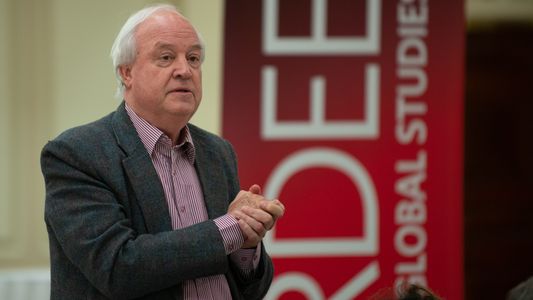Heine Discusses US-China Rivalry Amid a Non-Aligned Global South
Ambassador Jorge Heine was invited as a guest speaker on an episode of Polaris Live Podcasts to expound on active non-alignment, rise of the Global South, and the U.S.-China rivalry amid a distressing era of polycrisis. In the episode titled “China Winning Hearts and Minds in Latin America,” the ambassador spoke to host Sarwar Kashmeri about how the world has been shaken by the seismic effects of the pandemic, climate crisis, and wars in less than a decade. Heine underscored that the escalating tensions between the United States and China add to the world’s challenges, creating an environment resembling the Cold War.

“The Soviet Union was a significant superpower, nuclear power, space power, military power, ideological power,” said Heine. “But it had a smaller economy than the U.S. It also had a closed economy. What does this mean? That it couldn’t provide the sort of trade flows, investment flows, financial cooperation flows that developing countries needed and wanted. That is very different from the situation today. In PPP terms, the Chinese economy is larger than the U.S. economy, and has been so since 2014. According to some projections, it will be larger in nominal terms by 2030, or at least by 2035.”
Heine added that China is also a more open economy than America, generating substantial investment and trade for 130 countries, which naturally makes it the world’s number one trading partner. Countries today, therefore, want to embrace a neutral stance, and avoid siding with one of the superpowers and prioritize their own national interests.
“Countries in the developing world today have options that they didn’t have before,” said Heine. “And that opens the possibility of what we call active non-alignment. It’s a foreign policy approach that calls for countries, we’re talking mostly about the developing world, the Global South, to put their own interests front and center. They refuse to align themselves with either Washington or Beijing. They set their own priorities and they make the decisions accordingly. Now, this is not an easy task. It demands a very sophisticated diplomacy that is able to evaluate each issue on its own terms.”
The ambassador added that the Global South holds a stronger position in world politics today because of three significant events. First, its reaction to the Ukraine-Russia conflict, where several countries including India, South Africa, Brazil, and Pakistan did not align with the West. Second, the expansion of BRICS with five new country members, including Indonesia, world’s largest Muslim-majority country. Third, the Israel-Hamas war which triggered a massive criticism from countries in Asia, Africa, and Latin America due to Israel’s disproportionate reaction and genocidal activities in Gaza. An independent and uncompromising stance on these issues has pushed the Global South and its natural foreign policy — active non-alignment to the forefront, demonstrating that developing nations seek equal representation in global affairs.
Heine also reflected the significance of Zohran Mamdani’s recent victory as a mayor-elect for the Global South, considering he’s the first South Asian and Muslim politician to assume public office in New York.
“Mr. Mamdani is obviously a very talented young man that speaks the language that with which people in New York identify with,” said Heine. “I think it’s very exciting. We’ll see how he does. Obviously, good intentions are not enough. Often young leaders that are imbued with good intentions, do not necessarily have the skills to navigate complex bureaucracies. So it seems to me that is going to be a critical point. But let us keep our fingers crossed that things go well. There’s certainly much hope in my New Yorker friends.”
To listen to Ambassador Heine’s interview, click here.
A former research professor at the Frederick S. Pardee School of Global Studies, Jorge Heine is a diplomat, international relations scholar, and lawyer. He has served as an ambassador of Chile to China, India, and South Africa. Heine has written over fifteen books, including The Non-Aligned World: Striking Out in an Era of Great Power Competition (2025), which provides insights on how the Global South can navigate the changing diplomatic landscape amid the U.S.-China rivalry.